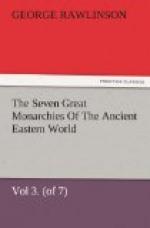This is the last act that we can ascribe to the great Median king. He can scarcely have been much less than seventy years old at this time; and his life was prolonged at the utmost three years longer. According to Herodotus, he died B.C. 593, after a reign of exactly forty years, leaving his crown to his son Astyages, whose marriage with a Lydian princess was above related.
We have no sufficient materials from which to draw out a complete character of Cyaxares. He appears to have possessed great ambition, considerable military ability, and a rare tenacity of purpose, which gained him his chief successes. At the same time he was not wanting in good sense, and could bring himself to withdraw from an enterprise, when he had misjudged the fitting time for it, or greatly miscalculated its difficulties. He was faithful to his friends, but thought treachery allowable towards his enemies. He knew how to conquer, but not how to organize, an empire; and, if we except his establishment of Magism, as the religion of the state, we may say that he did nothing to give permanency to the monarchy which he founded. He was a conqueror altogether after the Asiatic model, able to wield the sword, but not to guide the pen, to subdue his contemporaries to his will by his personal ascendency over them, but not to influence posterity by the establishment of a kingdom, or of institutions, on deep and stable foundations. The Empire, which owed to him its foundation, was the most shortlived of all the great Oriental monarchies, having begun and ended within the narrow space of three score and ten years—the natural lifetime of an individual.




